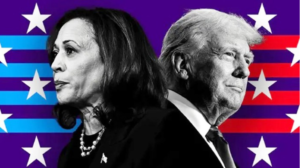Ahead of the upcoming US presidential election, investors in Asia are taking cautious steps to protect their assets and prepare for possible volatility. The political situation in the US, especially with the emergence of candidates such as Donald Trump and Kamala Harris, has caused investors to reassess their strategies, shifting away from high-risk investment channels to safer options such as cash, the Indian market, some sectors in China, and the Singapore dollar.
Uncertainty about the US election outcome could have a major impact on global trade and capital flows, especially for the Asia region – which serves as a major export hub. Investors are well aware that if US trade policy changes, they will face many difficulties, from pressure on commodity prices to risks of new tariffs and regulations.

Investors have begun to pull money out of highly speculative investments, including Japanese manufacturing stocks and Hong Kong stocks, according to multiple sources. Instead, they are looking for opportunities in sectors that are seen as less affected by US trade policy, such as consumer staples and utilities in India.
China, in this context, has emerged as a “safe haven” for investors. Jon Withaar, a fund manager at Pictet Asset Management, said the Chinese market currently has strong internal momentum and is less affected by fluctuations in global assets. He also stressed that staying on the sidelines and waiting would be a reasonable strategy in the current context.
As for Donald Trump, many investors predict that if he wins the election, there will be an increase in interest rates and economic growth, thereby reducing the possibility of rate cuts from the US Federal Reserve. Nick Ferres, chief investment officer at Vantage Point Asset Management, pointed out that the Japanese yen’s 6.5% fall against the US dollar in October was a sign that investors were looking for stability.
The Singapore dollar is also being seen as an attractive option in this context. Ray Sharma-Ong, chief investment officer for Southeast Asia at abrdn, said that the Singapore dollar will remain stable thanks to the country’s macroeconomic policies. Meanwhile, the Indian market, with its low export ratio and focus on the service sector, has emerged as a bright spot for investors. Sectors such as consumer staples and utilities are expected to perform better as the Indian market is less affected by trade tensions and tariffs.
However, caution remains in the air, as the US presidential election is expected to be too unpredictable. The election outcome could be protracted and economic policy may not be immediately clear. Emerging market funds have increased their exposure to China and North Asia over the past month and are likely to ramp up as the election moves forward, according to Goldman Sachs.
Gary Tan, portfolio manager at Allspring Global Investments, said that developing country stocks have a chance to grow next year regardless of who wins. Supportive policies from both China and the US could help drive a recovery in these markets. He also predicted that a victory for Kamala Harris could provide some upside for emerging markets, opening up new investment opportunities for investors in the region.
In short, ahead of the US presidential election, investors in Asia are developing clear strategies to deal with market uncertainty. They are shifting to less risky investments, focusing on markets with strong growth potential in the global context. This caution not only reflects current sentiment but also shows the wisdom of managing financial risk in a volatile environment.





